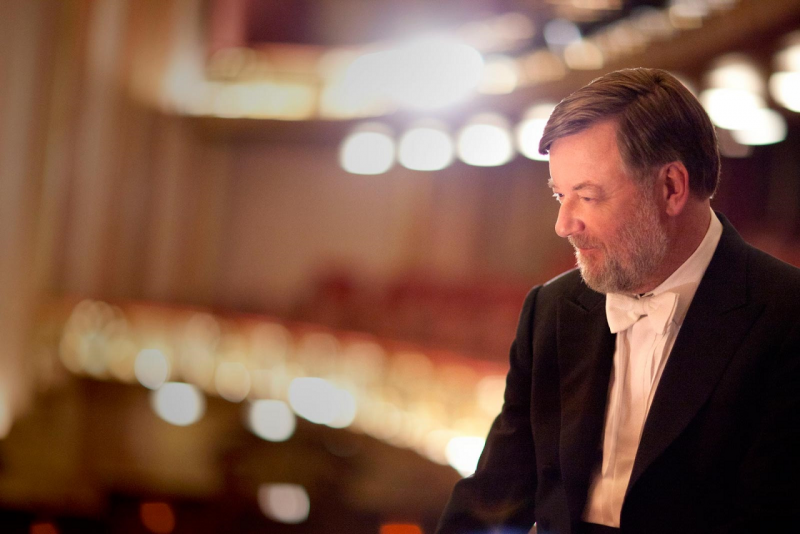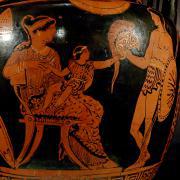Connolly, West, BBCSO, Davis, Barbican | reviews, news & interviews
Connolly, West, BBCSO, Davis, Barbican
Connolly, West, BBCSO, Davis, Barbican
Masterful Berlioz and the valuable revival of a war requiem. No, not that one...

From the strings’ first entry, sweet and mysterious, conveying at once the erotic charge between Berlioz's Dido and Aeneas, its long-suppressed unfolding and also its transience, the BBC Symphony Orchestra played like a dream for their conductor laureate Sir Andrew Davis.
There followed the death scene for another African queen, Le mort de Cléopâtre, allowing us to hear what Berlioz took from his failed competition entry for the Prix de Rome in 1829 – especially the pulse of the interlude before the final scene, regal and solemn yet burning with regret and shame – and refashioned for Dido’s farewell three decades later. Sarah Connolly made the attempt to give noble form and dignity to Cleopatra’s outpourings of fury at her dishonour, contained at the outset and singing through the line without alighting on each invitation for the kind of proto-Expressionist disruption offered by Berlioz’s word-painting, an attempt compromised more by composer than performer. The language of the piece sits unclassifiably between recitative and arioso, evading a harmonic centre or destination as the set text circles repetitively around the theme of “mes grandeurs opprimés” – my crushed majesty – into which the young Berlioz could already pour embittered heart and soul: I am right, but no one will know it until I am gone.
As much as Berlioz has been a running thread through Davis’s career, so has advocacy of the English choral tradition from Purcell to Colin Matthews and Julian Anderson. Morning Heroes is a now-neglected corner of that tradition, but as he demonstrated in a performance fired with the necessary conviction, well worthy of occasional revival. Sir Arthur Bliss wrote it in 1930 in memory of his brother who fought (as he had) and died at the Somme, “and all other comrades killed in battle”. In the cumulative effect of its texts chosen by the composer as “common to all ages and all times”, the piece might have become a War Requiem, were it not for… War Requiem, Britten's, which elbowed Bliss’s own commission (a setting of The Beatitudes) for the consecration of Coventry Cathedral in 1961 out of the new building and into a nearby theatre.
Morning Heroes is similarly overshadowed, and yet hardly more reliant on the tropes of its time than Britten was on the examples of Mozart and Verdi. Long sections from "Drum-Taps" are trapped into hasty declamation and resort to a pale but shouty imitation of Vaughan Williams setting Whitman in A Sea Symphony. Between them, the long, introverted melodies and sumptuous orchestration of his Li Po setting are worthy of Rachmaninov, even Elgar’s Gerontian musings, but now seem out of proportion to the poem’s embroidery of a blood-stained silk cushion.
 Most personal and affecting were the work’s prologue and epilogue, calling upon Sam West with subtly scored orations of Hector’s Farewell to Andromache (pictured left on an Apulian red-figure column-crater, ca. 370–360 BC), in the patrician tones of Walter Leaf’s translation which Bliss would have known as a schoolboy, and Owen’s Spring Offensive. Owen closes with a rhetorical accusation – “Why speak they not of comrades that went under?” – of such caustic finality that no answer seems possible, yet Bliss supplies it with a choral setting of Robert Nichols’a Dawn on the Somme that, like the excerpt from Chapman’s Homer describing Achilles set fair for war in all his glory, pays ambivalent tribute to the heroism as well as the waste of those thousands who had died around him. The BBC Symphony Chorus excelled themselves in clarity of diction and singing of unflagging vigour. Now batonless but working with a smile like Pierre Boulez, a predecessor of his tenure at the BBCSO, Davis conducted with the understated authority of a man in charge and at home.
Most personal and affecting were the work’s prologue and epilogue, calling upon Sam West with subtly scored orations of Hector’s Farewell to Andromache (pictured left on an Apulian red-figure column-crater, ca. 370–360 BC), in the patrician tones of Walter Leaf’s translation which Bliss would have known as a schoolboy, and Owen’s Spring Offensive. Owen closes with a rhetorical accusation – “Why speak they not of comrades that went under?” – of such caustic finality that no answer seems possible, yet Bliss supplies it with a choral setting of Robert Nichols’a Dawn on the Somme that, like the excerpt from Chapman’s Homer describing Achilles set fair for war in all his glory, pays ambivalent tribute to the heroism as well as the waste of those thousands who had died around him. The BBC Symphony Chorus excelled themselves in clarity of diction and singing of unflagging vigour. Now batonless but working with a smile like Pierre Boulez, a predecessor of his tenure at the BBCSO, Davis conducted with the understated authority of a man in charge and at home.
- Listen here to the concert on the BBC iPlayer until 15 June
rating
Explore topics
Share this article
The future of Arts Journalism
You can stop theartsdesk.com closing!
We urgently need financing to survive. Our fundraising drive has thus far raised £49,000 but we need to reach £100,000 or we will be forced to close. Please contribute here: https://gofund.me/c3f6033d
And if you can forward this information to anyone who might assist, we’d be grateful.

Subscribe to theartsdesk.com
Thank you for continuing to read our work on theartsdesk.com. For unlimited access to every article in its entirety, including our archive of more than 15,000 pieces, we're asking for £5 per month or £40 per year. We feel it's a very good deal, and hope you do too.
To take a subscription now simply click here.
And if you're looking for that extra gift for a friend or family member, why not treat them to a theartsdesk.com gift subscription?
more Classical music
 Bizet in 150th anniversary year: rich and rare French offerings from Palazzetto Bru Zane
Specialists in French romantic music unveil a treasure trove both live and on disc
Bizet in 150th anniversary year: rich and rare French offerings from Palazzetto Bru Zane
Specialists in French romantic music unveil a treasure trove both live and on disc
 Scottish Chamber Orchestra, Ibragimova, Queen’s Hall, Edinburgh review - rarities, novelties and drumrolls
A pity the SCO didn't pick a better showcase for a shining guest artist
Scottish Chamber Orchestra, Ibragimova, Queen’s Hall, Edinburgh review - rarities, novelties and drumrolls
A pity the SCO didn't pick a better showcase for a shining guest artist
 Kilsby, Parkes, Sinfonia of London, Wilson, Barbican review - string things zing and sing in expert hands
British masterpieces for strings plus other-worldly tenor and horn - and a muscular rarity
Kilsby, Parkes, Sinfonia of London, Wilson, Barbican review - string things zing and sing in expert hands
British masterpieces for strings plus other-worldly tenor and horn - and a muscular rarity
 From Historical to Hip-Hop, Classically Black Music Festival, Kings Place review - a cluster of impressive stars for the future
From quasi-Mozartian elegance to the gritty humour of a kitchen inspection
From Historical to Hip-Hop, Classically Black Music Festival, Kings Place review - a cluster of impressive stars for the future
From quasi-Mozartian elegance to the gritty humour of a kitchen inspection
 Shibe, LSO, Adès, Barbican review - gaudy and glorious new music alongside serene Sibelius
Adès’s passion makes persuasive case for the music he loves, both new and old
Shibe, LSO, Adès, Barbican review - gaudy and glorious new music alongside serene Sibelius
Adès’s passion makes persuasive case for the music he loves, both new and old
 Anja Mittermüller, Richard Fu, Wigmore Hall review - a glorious hall debut
The Austrian mezzo shines - at the age of 22
Anja Mittermüller, Richard Fu, Wigmore Hall review - a glorious hall debut
The Austrian mezzo shines - at the age of 22
 First Person: clarinettist Oliver Pashley on the new horizons of The Hermes Experiment's latest album
Compositions by members of this unusual quartet feature for the first time
First Person: clarinettist Oliver Pashley on the new horizons of The Hermes Experiment's latest album
Compositions by members of this unusual quartet feature for the first time
 Gesualdo Passione, Les Arts Florissants, Amala Dior Company, Barbican review - inspired collaboration excavates the music's humanity
At times it was like watching an anarchic religious procession
Gesualdo Passione, Les Arts Florissants, Amala Dior Company, Barbican review - inspired collaboration excavates the music's humanity
At times it was like watching an anarchic religious procession
 Classical CDs: Camels, concrete and cabaret
An influential American composer's 90th birthday box, plus British piano concertos and a father-and-son duo
Classical CDs: Camels, concrete and cabaret
An influential American composer's 90th birthday box, plus British piano concertos and a father-and-son duo
 Cockerham, Manchester Camerata, Sheen, Martin Harris Centre, Manchester review - re-enacting the dawn of modernism
Two UK premieres added to three miniatures from a seminal event of January 1914
Cockerham, Manchester Camerata, Sheen, Martin Harris Centre, Manchester review - re-enacting the dawn of modernism
Two UK premieres added to three miniatures from a seminal event of January 1914
 Kempf, Brno Philharmonic, Davies, Bridgewater Hall, Manchester review - European tradition meets American jazz
Bouncing Czechs enjoy their Gershwin and Brubeck alongside Janáček and Dvořák
Kempf, Brno Philharmonic, Davies, Bridgewater Hall, Manchester review - European tradition meets American jazz
Bouncing Czechs enjoy their Gershwin and Brubeck alongside Janáček and Dvořák
 Solomon, OAE, Butt, QEH review - daft Biblical whitewashing with great choruses
Even a top soprano and mezzo can’t make this Handel paean wholly convincing
Solomon, OAE, Butt, QEH review - daft Biblical whitewashing with great choruses
Even a top soprano and mezzo can’t make this Handel paean wholly convincing

Add comment